
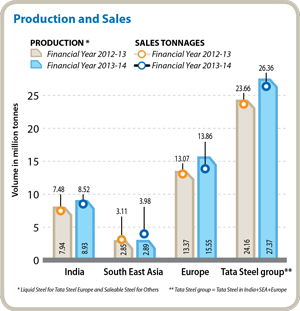 |
THE JOURNEY SO FAR The business model of the Tata Steel group is aligned to its vision of “Becoming the Benchmark in Value Creation and Corporate Citizenship” in the steel industry. Through this, it maintains a strategic focus on continuous value creation for all its stakeholders. The Company is one of the largest steel producers in the world and one of the world’s most geographically diversified, with operations in 26 countries and a commercial presence in over 50 countries. With a focus on continuous improvement, the Company meets diverse customer requirements across multiple segments, globally. India The new facilities of the 2.9 million tonnes per annum brownfield expansion at Jamshedpur reached their full capacity in the second half of Financial Year 2013-14 which helped register the best-ever performance in Hot Metal, Crude Steel, Saleable Steel production and total sales. The economic growth in India remained quiet on the back of high inflation, high interest rates, low industrial growth and low investments in the country, along with the poor condition of the global economy. Steel demand in India remained almost flat in the last year. Despite the weak macroeconomic environment, the performance of the Indian operations improved significantly. Crude Steel production reached 9.15 million tonnes in Financial Year 2013-14, registering a 13% increase over the previous year notwithstanding scheduled maintenance shutdowns carried out in Q3. To cater to the increased requirements, the iron ore mines also ramped up to required quantities. Customer focus, better products and vast distribution network helped additional sales of 1 million tonnes over the previous year. Sales increased by 14% to 8.52 million tonnes in Financial Year 2013-14 from 7.48 million tonnes in Financial Year 2012-13. In Financial Year 2013-14 EBITDA improved to Rs.13,281 crores, up 14% from Rs.11,698 crores in Financial Year 2012-13. Sales of Automotive and Special Products increased by 15% in Financial Year 2013-14 despite an approximate 5% decline in the auto market. Sale of Branded Products, Retail and Solutions constituted 34% of the total sales and increased by 11% over the previous year. Sale of Industrial Products, Projects and Exports increased by 18% over Financial Year 2012-13. Proactive market development has helped in expanding the domestic customer base. Ferro Alloys and Minerals Division (FAMD) continued to support steel divisions profitability despite facing regulatory issues. FAMD maximised profits by judicious allocation of products to profitable geographies. It also launched two new brands in the ferro-alloys industry to improve its visibility in the Indian market. Tubes Division, a Strategic Business Unit (SBU) which manufactures and markets a wide range of steel tubes and pipes, achieved the highest ever sales of 0.417 million tonnes in Financial Year 2013-14 registering an all-time high sale 0.153 million tonnes of ‘Tata Structura’ brand for structural tubes for the construction segment. This was achieved primarily through increase in channel network and offering better value proposition to customers. The Company's focus on its operational performance through the continual improvement programmes has made it one of the most competitive steel operations in the industry. Tata Steel identifies opportunities for process improvement through TQM vehicles like Policy Management, Daily Management and Cross Functional Management among others. In Financial Year 2013-14, the Company continued its focussed improvements in the quality of products and services. It has brought about a steep improvement in quality with strengthening of Quality Assurance systems through standardisation initiatives like Tata Steel Standard for Lab Management, cross functional activities with respect to the deployment of Quality Module, facilitating Process Audits, Quality reviews etc. The Company achieved a savings of Rs.1,614 crores by improving operational excellence through focussed initiatives in Financial Year 2013-14, with ‘Kar Vijay Har Shikhar’ (KVHS) contributing Rs.1,170 crores. In Financial Year 2013-14, the Company’s West Bokaro Division has achieved highest-ever clean coal production of 2.577 million tonnes @ 15.5% ash content against previous best of 2.339 million tonnes @ 14.37%. To achieve clean coal targets, various interventions are being used. With a view to achieving operational excellence in supply chain, Tata Steel has implemented a Hub and Spoke model with multiple hubs at Delhi, Faridabad, Chennai, Gannavarm, Nagpur and Kolkata to optimise order lead times. Aligning with the 2.9 million tonnes per annum brownfield expansion at Jamshedpur and greenfield expansion at Odisha, investments have been made in the supply chain logistics integrated with its downstream expansion initiatives. The project work for setting up a 3 million tonnes per annum greenfield steel project in Odisha in first phase is on in full swing and is expected to commission by Financial Year 2014-15. About Rs.8,000 crores were spent in Financial Year 2013-14. CSR initiatives such as promoting education, schools and community libraries, enhancement of vocational skills and livelihood enhancement projects are also continuing. Foundation stone was laid for a 200-bed hospital at Kalinganagar and a 500-bed hospital at Gopalpur. |
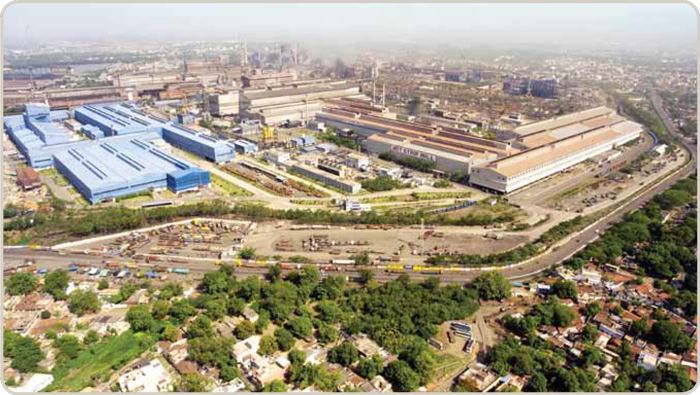
Pan-view of facility in Jamshedpur, India |
|
|
South East Asia The South East Asian operations performed moderately well with product differentiation, efficiency improvements and improved synergy, amidst stiff competition from low-priced China imports and political uncertainty in Thailand. In particular, Tata Steel Thailand (TSTH) performed well and returned to profitability after 4 years. The rapid urbanisation sweeping through the growing economies of Asia augurs well for NatSteel. As the construction markets across the region mature, productivity and safety become increasingly paramount, providing an opportunity for NatSteel to be a partner in supplying value-added solutions that alleviate construction challenges. Leveraging its vast expertise in offering customised solutions, NatSteel aims to set up prefabrication centres across Asia to serve customers wherever they may operate. One of such new centres is in Johor Bahru, where Easteel Services has begun operations in 2013 to supply Cut-and-Bend and Welded Mesh products for the precast and high-rise building industries located in the region. NatSteel aims to set up several such centres in other geographies in the next few years to come. In the Financial Year 2013-14, NatSteel continued to take bold steps towards operational excellence by enhancing its capabilities across all geographies, despite a volatile and highly competitive business environment. The Singapore construction market continues to grow albeit at a slower pace as public sector construction spending rose to offset the flat growth in private sector construction. The Singapore business continues to achieve highest ever reinforcement solutions sales of 0.512 million tonnes and build capability for 0.6 million tonnes per annum for Financial Year 2014-15. However, margins were under pressure throughout the year even as the Company revamped several facilities in its Singapore operations. Financial Year 2013-14 saw a continuous decline in steel bar prices and increased competitive intensity in the Singapore Downstream business. The Company’s operations in China saw through a difficult year with slowing demand growth and an intensely competitive environment. Sales grew from 0.653 million tonnes in Financial Year 2012-13 to 1.4 million tonnes in Financial Year 2013-14. The plants in Xiamen and Fuzhou now have a combined production capacity of 1.2 million tonnes per annum. At TSTH, effective execution of the turnaround programme launched 3 years ago has delivered satisfactory results. The key to success was the integrated implementation of operational and commercial excellence initiatives. |
|
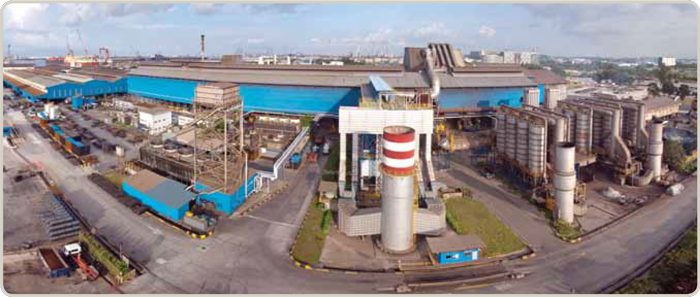
Baghouse facility at NatSteel, Singapore |
|
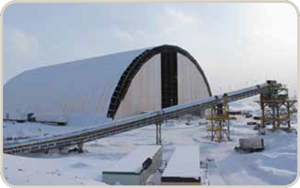 Mining operations under extreme conditions, |
Baghouse facility at NatSteel, Singapore The Company achieved 10% increase in sales over Financial Year 2012-13. Tata Tiscon Rebars sales at 0.86 million tonnes is best-ever annual sales with significant increase coming from regional markets and organised retail. To address the concern of low-priced Chinese imports, the Company had taken firm steps with Government authorities. The Ministry of Commerce in Thailand has acknowledged the injury to the business due to low-priced imports of high carbon wire rods from China and has recently announced the imposition of permanent anti-dumping duty in May 2014. In terms of other significant achievements, TSTH has recorded its lowest-ever Lost Time Injury Frequency Rate (LTIFR) of 0.33 with zero fatality. One of the subsidiary, NTS steel group Company Limited has been awarded the Prime Minister Safety Award in 2013. The Company improved its EBITDA performance by over 50% compared to the previous year. TSTH has continued its focus on development of new products and value-added services. A new cut and bend plant is being set up at one of its subsidiary SCSC to meet the high potential demand in this segment. TSTH was recognised by the Stock Exchange of Thailand for Outstanding CSR Award and CSR Recognition award in 2013. In addition to expanding reinforcement solutions volumes in Singapore and Thailand, new reinforcement solutions operations have been set up in Malaysia and Xiamen to further add value to existing customers businesses. The restructured Australian business turned cash positive. In the wires business, Siam Industrial Wires (SIW) performed exceedingly well and achieved highest ever profits. A new galvanised wires plant, joint venture between SIW and Nichia Steel Works Limited, has been set up in Rayong, Thailand. A new LRPC line is also planned at SIW during this year. Other Global Operations South Africa The Tata Steel KZN is Tata Steel’s first overseas greenfield project. The ferro-chrome plant was commissioned in 2008 with a total investment of ~ ZAR 1 bn. The plant has achieved an annual turnover of over ~ ZAR 950 Mn (~$ 130 Mn). With a production capacity of 1,50,000 tonnes per annum, the state-of-the-art plant has facilities for briquetting, slag chemical recovery and pollution abolition equipment for both air and water. Tata Steel KZN has successfully implemented CSR programmes that have been described by the local communities as meaningful and sustainable and has contributed towards betterment of several institutions. Canada Tata Steel Minerals Canada Limited (TSMC) is a joint venture between Tata Steel Ltd. (80%) and New Millennium Iron Corp. (20%). This investment is highly strategic as it is an important source of sinter fines for Tata Steel Europe operations. The project has a volume plan of 6 million tonnes per annum and reserves of ~ 93 million tonnes. The project has made steady progress with appointment of Engineering Procurement and Construction Management (EPCM), installment of camp, signing Impact Benefit Agreements (IBAs), receiving environmental release and permits, installation of the dome and securing logistics. The project has achieved production of 1 million tonnes until Q4 2013. The year 2015 is likely to see start-up and commissioning, and a 40% ramp up of the project. TSMC recognises the following pillars as its foundation for reaching social and environmental acceptability for its mining projects: Respectful & Effective Partnership with Aboriginal Nations; Respect for the Environment and its Sustainable Development; Economic Growth for the Community; and Empowerment and Capacity-building. It has also worked towards creating jobs, both directly and indirectly, and developing infrastructure, thus contributing to economic growth of society.
Europe The manufacturing facilities at Tata Steel Europe comprise manufacturing hubs (Strip Products Mainland Europe, Strip Products UK, Long Products Europe and Downstream Operations) and Integrated Businesses (Plating, CogentPower, Speciality and Bar). Tata Steel has organised its European business into strategic market sectors. The sector teams develop the commercial plan of the business taking into account its differentiated product strategy to secure long-term relationships with its customers. The single pan-European supply chain allocates demand across the manufacturing facilities and distribution channels to maximise operational efficiencies and minimise costs. Tata Steel produced 15.5 million tonnes of liquid steel in Europe in Financial Year 2013-14, which was 2.2 million tonnes higher than the previous year due to the rebuild of Blast Furnace 4 at Port Talbot and the repair of a blast furnace hearth in IJmuiden in Financial Year 2012-13. In addition, output levels in Financial Year 2013-14 were positively impacted by the achievement of more stable and reliable operations, which included numerous steelmaking production records, in particular at Port Talbot. Record performances at the European operations during Financial Year 2013-14 included best-ever hot metal make at Port Talbot’s Blast Furnace 4, best total hot dipped galvanising line output on the Zodiac line at Llanwern and the best-ever total Hot Strip Mill output at IJmuiden. Turnover at the European operations in Financial Year 2013-14 was 3% lower than the previous year in GBP£ terms. This was due to the decrease in the average revenue per tonne caused primarily by deterioration in the market condition in the first half of Financial Year 2013-14, partly offset by a 6% increase to steel deliveries which was attributable mainly to a full year of two blast furnaces operation at Port Talbot. The focus on costs resulted in approaching GBP200 Mn in operating cost savings during the year. Financial performance consequently improved over the previous year, despite the margin between raw materials costs and steel sales prices deteriorating. |
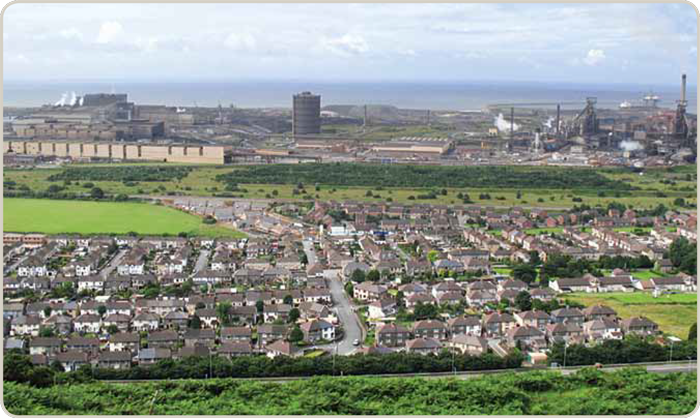
Pan-view of Port Talbot facility, Tata Steel Europe |
|
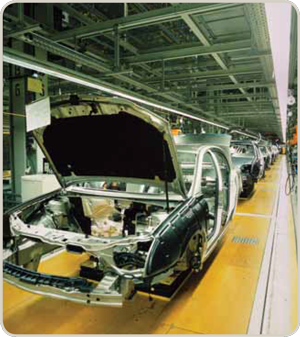 Manufacturing lighter and more fuel-efficient cars, |
The lower margins in Financial Year 2013-14 compared to the previous year, demonstrate the need for the European operations to maintain relentless focus on the market differentiation strategy and further operational and cost improvements. The European operations have made good progress in moving to a customer-focussed, market sector-based operating model with a cost competitive asset base. Tata Steel Europe is focussed on increasing its proportion of high-value differentiated products and services with a record 30 new products launched in Financial Year 2013-14. The volume of new products sold increased by about 75% and sales of differentiated products also increased as compared to the previous year. The product differentiation strategy secured some notable successes during the year, including: Automotive
Rail During the Financial Year 2013-14 Tata Steel won two important rail contracts:
Lifting & Excavating As a result of strengthening customer focus, improvements were secured in the product and service portfolio. These led to awards and other successes with customers, including:
During Financial Year 2013-14, a third test of HIsarna, a new technology which enables the direct input of coal and fine iron ore into the iron making furnace, was completed. A 60,000 tonnes per annum HIsarna pilot plant was built previously at the Tata Steel site in IJmuiden, the Netherlands, with support from the European Commission and the Dutch Government. Should the HIsarna technology prove technically and commercially viable, the elimination of processing steps could reduce the emission of carbon dioxide from conventional iron making by 20%. |


